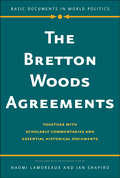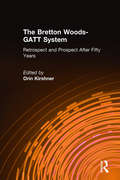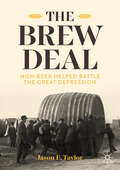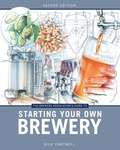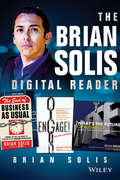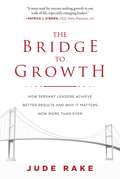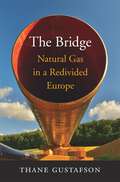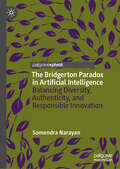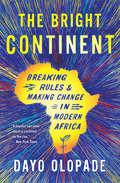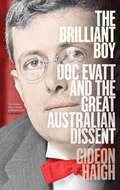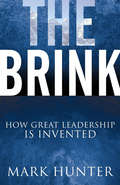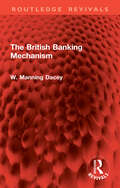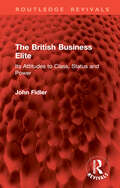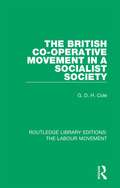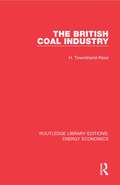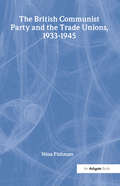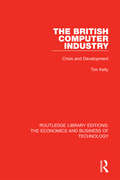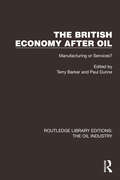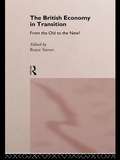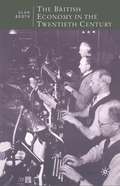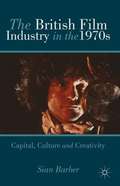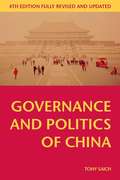- Table View
- List View
The Bretton Woods Agreements: Together with Scholarly Commentaries and Essential Historical Documents (Basic Documents in World Politics)
by Ian Shapiro Naomi LamoreauxCommentaries by top scholars alongside the most important documents and speeches concerning the Bretton Woods Conference of 1944 The two world wars brought an end to a long-standing system of international commerce based on the gold standard. After the First World War, the weaknesses in the gold standard contributed to hyperinflation, the Great Depression, the rise of fascism, and ultimately World War II. The Bretton Woods Conference of 1944 arose out of the Allies’ desire to design a postwar international economic system that would provide a basis for prosperity, trade, and worldwide economic development. Alongside important documents and speeches concerning the adoption and evolution of the Bretton Woods system, this volume includes lively, readable, original essays on such topics as why the gold standard was doomed, how Bretton Woods encouraged the adoption of Keynesian economics, how the agreements influenced late‑twentieth‑century ideas of international development, and why the agreements ultimately had to give way to other arrangements.
The Bretton Woods-GATT System: Retrospect and Prospect After Fifty Years
by Orin KirshnerA collection by founders and early leaders of the International Monetary Fund (IMF), the World Bank, and the General Agreement on Tariffs and Trade (GATT), presenting the current thinking on the past, present and future of the postwar system of international finance and trade.
The Brew Deal: How Beer Helped Battle the Great Depression
by Jason E. TaylorDuring the final stages of Prohibition, the US government allowed the consumption and sale of “non-intoxicating” beer, which was at or below 3.2% alcohol-by-weight. Beer’s return—permitted with an eye toward job creation during the Great Depression—was one of President Franklin D. Roosevelt’s earliest New Deal policies. In this book, economic historian Jason E. Taylor takes readers through the rapid resurgence of American breweries and shows how beer helped spark a sharp recovery in the spring of 1933. Taylor begins with stories of how the nation’s 1,400 breweries were decimated by the onset of Prohibition in 1920. He then turns to the frothy debates that led Congress to declare 3.2 beer “non-intoxicating,” and hence allowable under Prohibition. While April 7th is now celebrated as “National Beer Day,” the original April 7th—when legal beer returned after more than 13 years away—brought raucous scenes that make today’s Mardi Gras festivities seem tame by comparison. The Brew Deal shares stories of breweries, people, politics, perseverance, and the various roles that 3.2 beer has played in the evolving American beer scene.
The Brewers Association's Guide to Starting Your Own Brewery
by Dick CantwellThe Brewers Association's Guide to Starting Your Own Brewery distills the wisdom of craft brewing veteran Dick Cantwell into one text that delivers essential industry insight. American craft brewers have always exhibited a sense of community and collegiality but the success of the industry is embodied by the production of consistently high-quality beer at community-oriented breweries. This book is an indispensable resource for aspiring brewery owners to turn that vision into reality.At every level, brewing is about careful planning and execution of processes. The author shows that this is no different when starting a brewery. Cantwell walks the reader through initial planning, from site selection, size, staffing levels, your brewery concept, and dealing with delays, to business planning and raising capital. Regulatory and legal issues are discussed—not least a brewery's obligations to the inland revenue service—along with strategies essential for starting and growing your operation, such as production and sales planning and brewery expansion either on site or opening new locations. The author includes several example business plans that are explored in detail, and peppers the book with his own personal and hard-won insights on everything from guerilla marketing to applying epoxy resin flooring. Within this big picture, the author weaves in critical aspects like brand identity, marketing, quality assurance, and distribution, not to mention details like equipment options, securing ingredients, and installing flooring and drainage that will stand up to the demands of a busy brewery. Finally, once your brewery opens its doors, the process of brewing needs to continue smoothly. You need to plan and adapt your brand portfolio, operate sustainably, dispose of wastewater correctly, and package and present your product in a way that will appeal to customers. Craft breweries pride themselves on conscientious operation, maintaining the safety of their staff and operating responsibly within their community, all the while being profitable. From concept to operation, this book gets you on the right track to succeed in one of today's most dynamic industries.
The Brian Solis Digital Reader
by Brian SolisBook set on communicating and connecting with customers today and in the futureThis is a three-publication set from thought leader Brian Solis covering social media and new media, the evolution of business, and the future of business. Engage! looks at social media and how to participate as a business while engaging your audience. What's the Future of Business? discusses topics such as the customer journey and the critical nature of the user experience. The End of Business as Usual reviews the evolution of the network economy and digital lifestyles. Moving forward successfully with your business communications is an overall theme of the set.
The Bridge to Growth: How Servant Leaders Achieve Better Results and Why It Matters Now More Than Ever
by Jude RakeA recent study revealed that only 21 percent of workers feel engaged and truly committed to their company’s success and goals. They don’t know how their work connects to their company’s goals or understand how they can help achieve them. Leaders have failed to fully engage workers in the development and execution of their company’s mission and goals, and ultimately its journey toward success. Too often, employees are over-managed and under-led. Jude Rake, a business leader with more than 35 years of experience leading high-performance teams, shows how servant leaders—those who serve employees by giving them what they need to fully engage and commit to achieving the company’s goals—use nine proven principles to succeed:Grow leaders and difference makers, not just followers.Build and orchestrate high-performance teams more powerful than the sum of their parts. Focus the organization on strategic priorities, simplify operations, and accelerate progress.Champion the people who purchase and use your products and services.Cultivate a performance-based culture of innovation.Communicate relentlessly.See the world through the eyes of others. Be the model you want emulated. Coach people to achieve more than they thought possible.The Bridge to Growth details how to use these principles to elevate workforce engagement, collaboration, innovation, and accountability to build a bridge from strategy to exceptional execution and results.
The Bridge: Natural Gas in a Redivided Europe
by Thane GustafsonEurope and Russia are pushing against each other in a contest of economic doctrines and political ambitions, seemingly erasing the vision of cooperation that emerged from the end of the Cold War. Thane Gustafson argues that natural gas serves as a bridge over troubled geopolitical waters, uniting the region through common economic interests.
The Bridgerton Paradox in Artificial Intelligence: Balancing Diversity, Authenticity, and Responsible Innovation
by Somendra NarayanThe term 'Bridgerton Paradox' is inspired by the Netflix series 'Bridgerton', which depicts a racially inclusive elite society in Regency-era England, challenging traditional historical accuracy in favor of modern tastes and sensibilities. This creative choice mirrors the broader ethical and methodological challenges faced by AI technologies, which must navigate the delicate interplay between contemporary values of diversity and the preservation of historical contexts. This book offers a critical and forward-thinking examination of the interplay between diversity and historical authenticity in AI within the organisational setting. It provides a robust theoretical foundation, practical guidelines, and real-world examples, guiding the development of AI strategies that are both innovative and ethically sound. It will be of great interest to scholars and students of AI in business and society, diversity and inclusion and innovation strategy, as well as practitioners and policymakers seeking a nuanced opinion on the interplay of diversity and AI technologies.
The Brigham and Women's Hospital Innovation Hub: Driving Internal Innovation
by Robert S. Huckman Ariel D. SternCase
The Bright Continent: Breaking Rules & Making Change in Modern Africa
by Dayo Olopade&“For anyone who wants to understand how the African economy really works, The Bright Continent is a good place to start&” (Reuters). Dayo Olopade knew from personal experience that Western news reports on conflict, disease, and poverty obscure the true story of modern Africa. And so she crossed sub-Saharan Africa to document how ordinary people deal with their daily challenges. She found what cable news ignores: a continent of ambitious reformers and young social entrepreneurs driven by kanju—creativity born of African difficulty. It&’s a trait found in pioneers like Kenneth Nnebue, who turned cheap VHS tapes into the multimillion-dollar film industry Nollywood. Or Ushahidi, a technology collective that crowdsources citizen activism and disaster relief. A shining counterpoint to conventional wisdom, The Bright Continent rewrites Africa&’s challenges as opportunities to innovate, and celebrates a history of doing more with less as a powerful model for the rest of the world. &“[An] upbeat study of development in Africa . . . The book is written more in wonder at African ingenuity than in anger at foreign incomprehension.&” —The New Yorker &“A hopeful narrative about a continent on the rise.&” —The New York Times Book Review
The Brilliant Boy: Doc Evatt and the Great Australian Dissent
by Gideon HaighIn a quiet Sydney street in 1937, a seven year-old immigrant boy drowned in a ditch that had filled with rain after being left unfenced by council workers. How the law should deal with the trauma of the family&’s loss was one of the most complex and controversial cases to reach Australia&’s High Court, where it seized the imagination of its youngest and cleverest member. These days, &‘Doc&’ Evatt is remembered mainly as the hapless and divisive opposition leader during the long ascendancy of his great rival Sir Robert Menzies. Yet long before we spoke of &‘public intellectuals&’, Evatt was one: a dashing advocate, an inspired jurist, an outspoken opinion maker, one of our first popular historians and the nation&’s foremost champion of modern art. Through Evatt&’s innovative and empathic decision in Chester v the Council of Waverley Municipality, which argued for the law to acknowledge inner suffering as it did physical injury, Gideon Haigh rediscovers the most brilliant Australian of his day, a patriot with a vision of his country charting its own path and being its own example – the same attitude he brought to being the only Australian president of the UN General Assembly, and instrumental in the foundation of Israel. A feat of remarkable historical perception, deep research and masterful storytelling, The Brilliant Boy confirms Gideon Haigh as one of our finest writers of non-fiction. It shows Australia in a rare light, as a genuinely clever country prepared to contest big ideas and face the future confidently. 'Here is a master craftsman delivering one of his most finely honed works. Meticulous in its research, humane in its storytelling, The Brilliant Boy is Gideon Haigh at his lush, luminous best. Haigh shines a light on person, place and era with the sheer force of his intellect and the generosity of his words. The Brilliant Boy is simply a brilliant book.' Clare Wright, Stella-Prize winning author of The Forgotten Rebels of Eureka 'Gideon Haigh is one of Australia&’s most versatile and skilled historians.' Geoffrey Blainey 'This new biography of HV Evatt lifts the lid on his early life as a brilliant barrister and creative Justice of the High Court of Australia. It reveals the wellsprings that gave birth to his humanitarian and internationalist values that later helped in the creation of the United Nations. It helps to explain Evatt's valiant defence of liberty in fighting off the attempt to ban the communists in Australia. We need to constantly renew our acquaintance with such values. This book reminds us of Evatt's flawed genius but deep motivations, lest we ever forget.' The Hon Michael Kirby AC CMG
The Brink: How Great Leadership is Invented
by Mark HunterThe Brink is a method for generating leadership in an individual leader and on a team. It is based on the simple assertion that leadership is created in the face of some great challenge or obstacle to overcome, rather than in a vacuum or in comfortable places with no adversity. The Brink model uses climbing a mountain as an analogy throughout for creating that big challenge or goal, and then demonstrates how to create a team to climb it with and outlines the way to create leadership in everyone involved in the process. This metaphor transfers to virtually any leadership position one holds and is organized into a clear list of ingredients essential to leadership.
The British Abroad Since the Eighteenth Century, Volume 1
by Martin Farr Xavier Gu�ganThis book considers the British travelling beyond their isles over the last three hundred years, and through a range of interdisciplinary perspectives reflects on their taste for discovery and self-discovery both through the exploration - and exploitation - of other lands and peoples.
The British Banking Mechanism (Routledge Revivals)
by W. Manning DaceyFirst published in 1951, The British Banking Mechanism seeks to enable the reader to obtain a real understanding of the British financial system as it operated back in the 1950s.The book shows how the traditional concept of the Bank of England as the supreme monetary authority controlling the volume of credit has to be modified now that the government, instead of private industry, is the chief borrower from the banking system. This book is of historical importance for scholars and students of banking history, British banking and British economics.
The British Business Elite: Its Attitudes to Class, Status and Power (Routledge Revivals)
by John FidlerFirst published in 1981, The British Business Elite is a study of the attitudes to class, status and power of top businessmen in Great Britain, based upon first-hand interviews with chairmen, chief executives and other directors of Britain’s largest industrial, banking and insurance companies: men of genuine wealth and power. Dr Fidler produces important empirical data in a field of study which has been plagued with problems of access; a field in which much of the theory has been based on assumptions.The book includes a careful examination of the background and career of those interviewed; a discussion of the way in which businessmen see the objectives of their companies, particularly relevant to the long-standing debate over the ownership and control of corporations; their views of class and status and of the power of businessmen in Britain. Finally, Dr Fidler considers the implications of the research for future theory and investigation.
The British Co-operative Movement in a Socialist Society (Routledge Library Editions: The Labour Movement #9)
by G. D. ColeFirst published in 1951. The purpose of this study was to consider the prospects of the British Co-operative movement in all its main aspects and not as a consumers’ movement only. The author examines ways in which the Co-operative enterprise, in its various forms, could best be fitted into the economic structure of the coming society. This title will be of great interest to scholars and students of labour history.
The British Coal Industry (Routledge Library Editions: Energy Economics)
by H. Townshend-RoseOriginally published in 1951, this book is a straightforward account of the British nationalized coal industry in the first half of the twentieth century. An introductory chapter gives the history of the industry during the inter-war years and subsequent chapters discuss the complex organization by which coal is marketed at home and overseas. The types and grades of coal and the price structure of the industry are considered. There is a section on finance which explains the capital structure of the industry and statistical charts focus on significant trends in output, man-power, absenteeism, accidents and similar vital features of the coal industry.
The British Communist Party and the Trade Unions, 1933–1945
by Nina FishmanThis is a pathbreaking book, essential reading for students of interwar political and social history. Previous histories of the period have underestimated the crucial role which Communists played in trade union organisation from top to bottom. Despite its relatively small size the Communist Party occupied a strategic place in the trade union movement: the leaders of the movement, notably Ernest Bevin, refused to acknowledge this at the time. Thanks to her extensive research and numerous interviews, and to the ’opening of the books’ of the Communist Part, Nina Fishman has been able to uncover a fascinating story, one which official Communist historians have never told, and which other historians could only recount in fragments. The main protagonists are the Communist Party General Seretary, Harry Pollitt, and the Editor of the Daily Worker, Johnny Campbell. The book brings to vivid life the work of activists on the shop floor and in the coalmines during the Depression and the Second World War. The book includes the first comprehensive analysis of Communist activity in key sectors of the British economy, notably in engineering shop stewards’ movements and among London busmen. It concludes with an authoritative review of Communists' part in the British war economy and a vigorous challenge to the conventional wisdom about the effect of Communist Party changes of line on the war on activists’ abilities to incite and lead strikes.
The British Computer Industry: Crisis and Development (Routledge Library Editions: The Economics and Business of Technology #23)
by Tim KellyOriginally published in 1987, this book explores the history and geography of the computer industry in Britain and the evolution of the market leader firms, STC ICL and IBM (UK). It also examines the rising rate of new firm formation in the 1980s and the technology policies adopted by successive governments and analyses how well the industry is placed to cope with the challenges of technological change and increased international competition.
The British Economy After Oil: Manufacturing or Services? (Routledge Library Editions: The Oil Industry #1)
by Terry BarkerThe British Economy After Oil (1988) examines the future paths for the British economy as North Sea oil runs out. It considers the argument that the future lies in the promotion and growth of services, as well as the counter-argument that the future lies with the development of a strong manufacturing base for the economy.
The British Economy in Transition: From the Old to the New?
by Royce TurnerThe British Economy in Transition: From the Old to the New? examines attempts at economic regeneration in areas that have experienced the decline in 'traditional' industry of recent years. The contributors also look at the impact of techno and managerial modernization strategies in industries that have survived, but have had to adapt rapidly to do
The British Economy in the Twentieth Century
by Alan BoothIt is commonplace to assume that the twentieth-century British economy has failed, falling from the world's richest industrial country in 1900 to one of the poorest nations of Western Europe in 2000. Manufacturing is inevitably the centre of this failure: British industrial managers cannot organise the proverbial 'knees-up' in a brewery; British workers are idle and greedy; its financial system is uniquely geared to the short term interests of the City rather than of manufacturing; its economic policies areperverse for industry; and its culture is fundamentally anti-industrial. There is a grain of truth in each of these statements, but only a grain. In this book, Alan Booth notes that Britain's living standards have definitely been overtaken, but evidence that Britain has fallen continuously further and further behindits major competitors is thin indeed. Although British manufacturing has been much criticised, it has performed comparatively better than the service sector. The British Economy in the Twentieth Century combines narrative with a conceptual and analytic approach to review British economic performance during the twentieth century in a controlled comparative framework. It looks at key themes, including economic growth and welfare, the working of the labour market, and the performance of entrepreneurs and managers. Alan Booth argues that a careful, balanced assessment (which must embrace the whole century rather than simply the post-war years) does not support the loud and persistent case for systematic failure in British management, labour, institutions, culture and economic policy. Relative decline has been much more modest, patchy and inevitable than commonly believed.
The British Electricity Experiment: Privatization: the record, the issues, the lessons (Energy and Infrastructure Set)
by John SurreyIn 1990, energy in the UK underwent a unique and fundamental transformation, with the privatization of the electricity supply industry. This is the first book to fully assess the experiment. It first explains how – and why – the British electricity supply industry was privatized. It then identifies the subsequent changes in electricity prices, profits, employment, investment, nuclear power and renewable, and the extent to which each of these was due solely to privatization or to other factors, or could have come about by reform of the previous model, rather than privatization. Finally, the authors analyse the key unresolved issues of regulation, introducing competition into the domestic energy market in 1998, supply security, and other long-term strategic considerations. Throughout, the distinguish between the uniquely British elements of the experience and those which can be drawn upon by other countries embarking upon similar reforms. Today, governments throughout the world are looking to the UK's experience as a potential prototype for the restructure of their own electricity supply industries. For them, and for electricity utilities, fuel and power plant suppliers, regulation authorities, financial analysts, international agencies, journalists and academics alike, this thorough and pragmatic study will be essential reading. 'This is likely to become the definitive book on the first six years of the great British electricity experiment' Walt Patterson The British Electricity Experiment is the result of a detailed study undertaken by the Energy Programme at the science Policy Research unit (SPRU). Professor John Surrey was head of SPR's Energy Programme between 1969 and 1986. He has worked with the central Electricity Generating Board, as a government Economic Adviser, and as a Specialist Adviser to numerous House of Commons Select Committee inquiries on energy matters. Originally published in 1996
The British Film Industry in the 1970s
by Sian BarberIs there more to 1970s British cinema than sex, horror and James Bond? This lively account argues that this is definitely the case and explores the cultural landscape of this much maligned decade to uncover hidden gems and to explode many of the well-established myths about 1970s British film and cinema.
The British Growth Crisis
by Colin Hay Peter Taylor-Gooby Jeremy GreenBritain remains mired in the most severe and prolonged economic crisis that it has faced since the 1930s. What would it take to find a new, more stable and more sustainable growth model for Britain in the years ahead? This important volume written by a number of influential commentators seeks to provide some answers.
